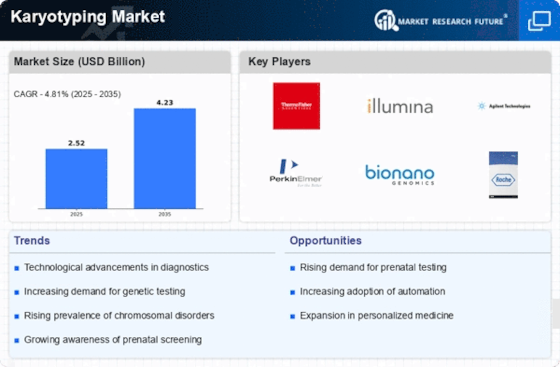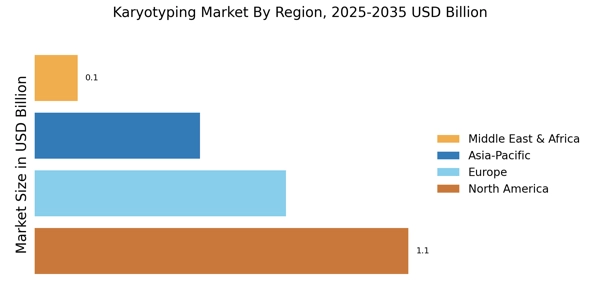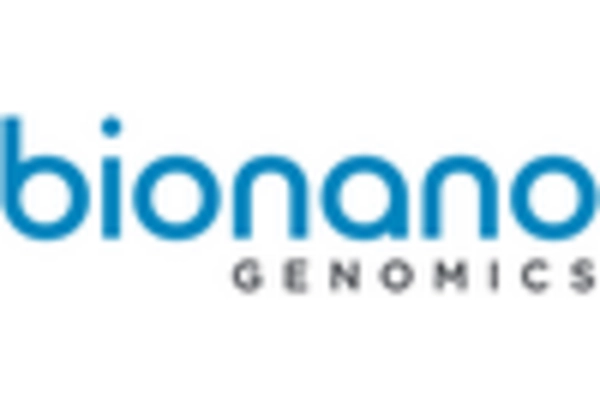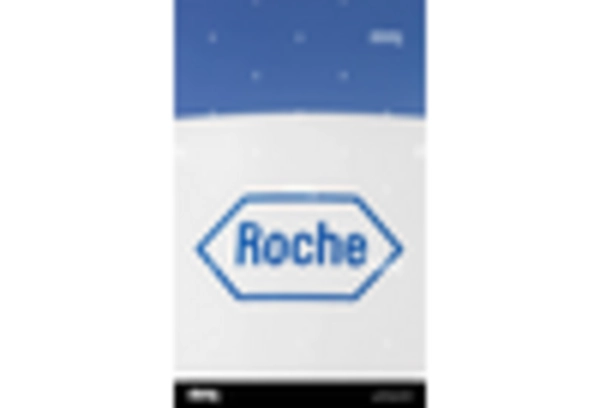Growing Demand for Prenatal Testing
The rising demand for prenatal testing is a significant factor propelling the Karyotyping Market. Expectant parents are increasingly seeking genetic screening to assess the risk of chromosomal abnormalities in their unborn children. This trend is supported by the fact that prenatal karyotyping can provide critical information regarding the health of the fetus, allowing for informed decision-making. According to recent statistics, the prenatal testing market is projected to grow at a compound annual growth rate (CAGR) of over 10% in the coming years. This surge in demand for prenatal testing services is likely to enhance the Karyotyping Market, as healthcare providers expand their offerings to include comprehensive genetic testing options.
Increased Focus on Cancer Diagnostics
The heightened emphasis on cancer diagnostics is driving growth in the Karyotyping Market. Karyotyping Market is instrumental in identifying chromosomal abnormalities associated with various cancers, which aids in prognosis and treatment decisions. As cancer rates continue to rise, the need for effective diagnostic tools becomes more pressing. Recent data suggests that nearly 1 in 3 individuals will be diagnosed with cancer in their lifetime, highlighting the critical role of karyotyping in oncology. This increasing focus on early detection and personalized treatment plans is likely to bolster the Karyotyping Market, as healthcare providers seek to implement advanced diagnostic techniques to improve patient outcomes.
Advancements in Karyotyping Techniques
Technological innovations in karyotyping methodologies are significantly influencing the Karyotyping Market. The introduction of high-resolution techniques, such as array comparative genomic hybridization (aCGH) and next-generation sequencing (NGS), has enhanced the accuracy and efficiency of chromosomal analysis. These advancements allow for the detection of submicroscopic chromosomal abnormalities that traditional methods may overlook. As a result, laboratories are increasingly adopting these advanced techniques, which is likely to drive market growth. The Karyotyping Market is poised to benefit from these innovations, as they not only improve diagnostic capabilities but also expand the range of applications for karyotyping in clinical settings.
Regulatory Support for Genetic Testing
Regulatory frameworks supporting genetic testing are fostering growth in the Karyotyping Market. Governments and health organizations are increasingly recognizing the importance of genetic testing in healthcare, leading to the establishment of guidelines and policies that promote its use. This regulatory support not only enhances the credibility of karyotyping services but also encourages healthcare providers to integrate these tests into routine clinical practice. As a result, the Karyotyping Market is likely to benefit from increased adoption rates, as healthcare systems align with regulatory recommendations to improve patient care and outcomes.
Rising Prevalence of Genetic Disorders
The increasing incidence of genetic disorders is a primary driver for the Karyotyping Market. As awareness of genetic conditions rises, healthcare providers are more inclined to utilize karyotyping for diagnosis and treatment planning. Reports indicate that approximately 1 in 200 births is affected by a chromosomal abnormality, which underscores the necessity for karyotyping services. This trend is likely to propel the demand for karyotyping, as it plays a crucial role in identifying chromosomal abnormalities that can lead to various genetic disorders. Consequently, the Karyotyping Market is expected to experience substantial growth as healthcare systems adapt to meet the needs of affected populations.

















